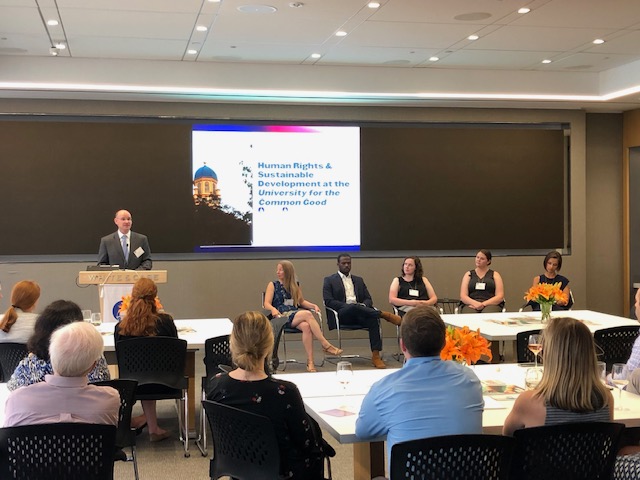Let's Talk Human Rights

Anchoring Peace, Justice and Inclusion
By Michael Oliver '20
A group of UD International Studies majors lead by Dr. Christopher Agnew, Director of the International Studies Program and associate professor in the Department of History, and Shelley Inglis, Executive Director of the Human Rights Center, supported research for the Global Alliance’s report," Enabling the Implementation of the 2030 Agenda Through SDG 16+: Anchoring Peace, Justice and Inclusion."
In the spring of 2019, six International Studies seniors in their capstone seminar were asked to conduct research for a report being produced by the Global Alliance for Reporting on Peaceful, Just and Inclusive Societies. The students, Guisela Crespo, Hannah Donovan, Nadia Pestell, Danny Pospiech, Ellie Rizzo and Yohaiza Vega, worked under the guidance of Dr. Christopher Agnew, Director of the International Studies Program and associate professor in the Department of History and Shelley Inglis, Executive Director of the Human Rights Center, to aggregate data on the measures and indicators that track global progress in achieving SDG 16+. When they were done they had the opportunity to present their findings to and field questions from the editorial team which consisted of representatives from UNODC, UN Women, UNHCR, OHCHR, UNESCO, and UNDP.
“The opportunity for our majors to conduct research that would contribute to an actual report presented to the UN was fantastic,” said Dr. Agnew. “The students were working with deadlines and expectations that were extremely demanding. It gave them all a real-world research experience that provided a grounded sense of what working in the field of international development and human rights might be like.”
The final version of the report, “Enabling the Implementation of the 2030 Agenda Through SDG 16+: Anchoring Peace, Justice and Inclusion", provides an overview of country level actions and progress on SDG 16+ across different regions and development contexts, and highlights key trends and findings on SDG 16+ implementation globally.
The report had three key findings. First, “[p]olitical and financial investment is needed to accelerate progress on SDG 16+”. This means that governments have to buy in and take ownership not just in policy but also in action to achieve SDG 16+. Second, “SDG 16+ implementation requires a ‘whole of government’ and ‘whole of society’ approach”, meaning that the responsibility does not fall solely on national government but also state and local governments, and on across all sectors of the society. Finally, “SDG 16+ is instrumental in protecting fundamental freedoms and ensuring that no one is left behind”. Many people are still prevented from enjoying an equal footing in society and ensuring equality is a key element of SDG 16+.
The report is being presented as part of the United Nations’ High Level Political Forum taking place from 9-18 July 2019 in New York. Forty-seven countries are presenting their voluntary reviews at this year’s forum which focuses on the following SDGs:
- Goal 4. On Education
- Goal 8. Employment and decent work
- Goal 10. Inequality within and among countries
- Goal 13. Climate change
- Goal 16. Peace, justice and inclusive institutions
- Goal 17. Global partnership
On the evening of July 16th, the Human Rights Center, in collaboration with the Dean’s office of the College and the Human Rights Studies Program, highlighted this report at an event with University alumni in New York. The event, Human Rights & Sustainable Development at the University for the Common Good, was hosted by White & Case, LLP. a corporate member of the Global Alliance, and featured opening remarks by Dean Jason Pierce, reflections by Dr. Natalie Hudson, and student panelists, Hannah Donovan (class of 2019), Mary McLaughlin and Ryan Scott. The students explored the experiential learning opportunities offered in human rights and global issues, including the Moral Courage Project and the Malawi Practicum, and reflected on what they have learned from these experiences.
“Much of what secured my current position [at the Palladium Group based in Washington, DC in their economic growth team] are core competencies of Human Rights and International Studies students from Dayton - from new and exciting research areas, strong writing capabilities, and confidence in presentation settings - that stand out in a professional setting,” said Hannah.
With over 30 Alumni in attendance, the evening provided an exciting opportunity to network and increase awareness of alumni in New York about new and evolving human rights and development opportunities at the University of Dayton.
